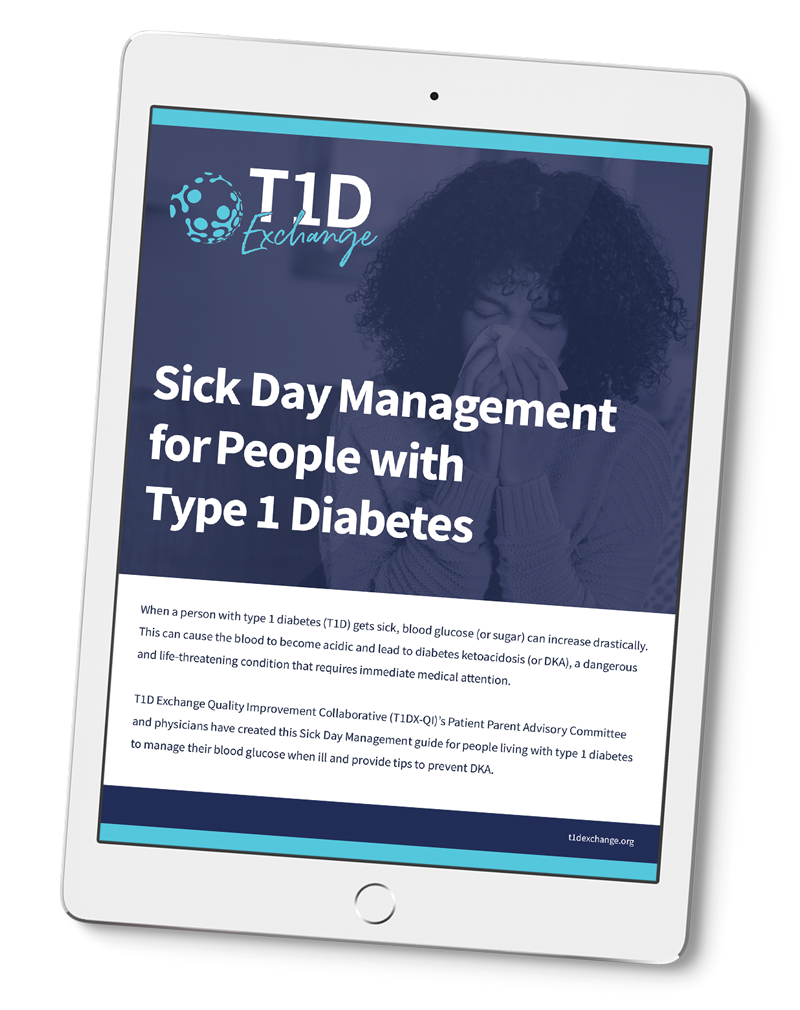
Sign up for a new account.
And get access to
The latest T1D content
Research that matters
Our daily questions
Sign up by entering your info below.
Reset Your Password
Don't worry.
We will email you instructions to reset your
password.
For a person with type 1 diabetes (T1D), everyday illnesses like the flu, a stomach virus, or a severe cold can have a big impact on your blood glucose levels and insulin needs. In some cases, a trip to the emergency department for intravenous fluids might be critical. Waiting too long to call your doctor can increase your risk of diabetic ketoacidosis (DKA) or severe hypoglycemia.
Physicians in the T1D Exchange Quality Improvement Collaborative (T1DX-QI) designed this downloadable Sick Day Guide for those affected by T1D and healthcare professionals.
Here’s what you need to know about managing T1D when you’re feeling “under the weather”:

Quick facts about any type of sickness or illness with T1D
- Stay hydrated! Dehydration can lead to high blood glucose levels and DKA. If you’re unable to keep fluids down, call your healthcare team and visit the nearest emergency department for intravenous fluids.
- Check your blood glucose often — ideally every 2-4 hours, if possible.
- Check your ketones at least once a day. If ketone levels increase to moderate or large levels, call your healthcare team and consider visiting the nearest emergency department for intravenous fluids.
- Make sure you’re getting some carbohydrates. Starvation ketones aren’t helpful if you’re already working to fight off illness-related ketones! Sip on watered-down juice or crackers (along with insulin per your doctor’s instructions) to ensure your body is getting what it needs while sick.
- Continue taking your insulin prescribed — even if you aren’t eating. Your body still needs basal/background insulin when you’re sick, but your healthcare team may decrease or increase the dose depending on the type of illness. If you aren’t eating meals, you likely do not need mealtime insulin. Your insulin doses for meals you do eat may need adjusting, too.
- If you develop any DKA symptoms (especially vomiting) go to the nearest emergency department quickly with a ride from a friend or by calling 911. DKA symptoms include repeated vomiting, very dry mouth, inability to urinate, fruity-smelling breath, stomach cramps, intense fatigue, and general flu-like symptoms.
- Make sure you have emergency glucagon nearby. You can’t predict when a stomach virus hits, and you suddenly need glucagon to compensate for insulin active in your bloodstream. Getting a prescription for emergency glucagon is a must!
Different types of illness have a different impact on your T1D
The impact of a sinus infection versus a 24-hour stomach bug are significantly different. It’s important to understand and anticipate the potential effect on your blood sugar in order to keep yourself safe.
Stomach virus: This can have the most urgent and immediate impact on your blood glucose levels and overall safety. If you start vomiting and cannot keep fluids (even just water) or food down, you should visit the nearest emergency department immediately.
When you’re unable to keep fluids down, two things can occur very quickly:
- You’re at risk of severe hypoglycemia depending on how much insulin is active in your system. This is a very good reason to ensure you have emergency glucagon on hand. If a stomach virus hits shortly after you’ve eaten a large meal, and you can’t keep the meal down — but you already dosed insulin for it — emergency glucagon can prevent or treat severe hypoglycemia. With or without emergency glucagon, consider calling 911.
- You’re at risk of DKA triggered by severe dehydration which can lead to further vomiting and other life-threatening concerns. Just vomiting a handful of times is enough to trigger severe dehydration if you’re unable to quickly replenish the fluid you lost. Getting intravenous fluids during a quick hospital visit (sometimes less than 12 hours) can get you back on track and prevent DKA while those short-lived stomach bugs pass quickly through your system. Waiting too long to get intravenous fluids when you’re vomiting and unable to drink fluids can lead very quickly to DKA. Don’t wait!
The flu: The trickiest part of the flu can be how long it lingers and its impact on your insulin needs. Viruses like the flu can lead to overall insulin resistance and call for a significant increase in your background and mealtime insulin. As your body works to battle off the virus, you’ll likely need to work with your healthcare team to quickly adjust your insulin doses. Drinking plenty of fluids to ensure you’re hydrated is a must! Consuming enough carbohydrates is also critical to prevent “starvation ketones” which can complicate your overall recovery from the flu and your safety with T1D.
Viral or bacterial infections: Any type of infection — including an everyday cold or sinus infection during a bad cold — can lead to noticeable insulin resistance. You’ll need to work with your healthcare team to adjust your insulin doses quickly while you continue to fight/treat the infection. Left untreated, the effect of any infection on your insulin sensitivity can increase dramatically. Adjusting your insulin doses promptly with support from your healthcare team is critical while your body works to fight the infection. With some infections, persistent high blood sugars can worsen the infection.
The greatest concern with any type of illness is severe hypoglycemia or DKA. Keep a close eye on your blood glucose levels and don’t wait too long before seeking more urgent help!







